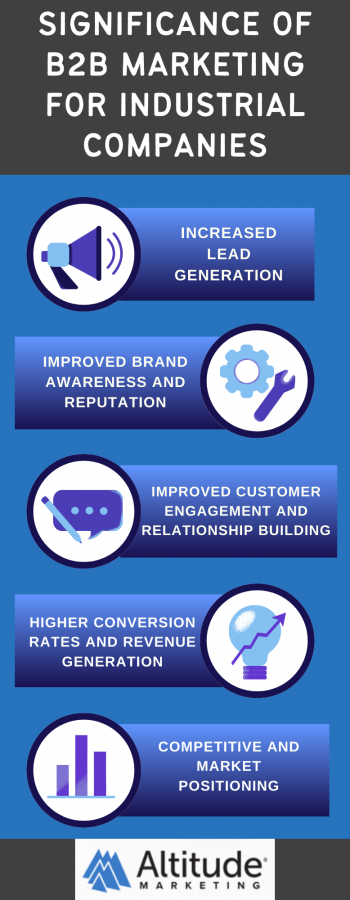Note: This blog was updated December 2024.
Last year, we predicted that content, automation and employee engagement would be key for manufacturing marketing. All three have come true. Creating great content has helped companies stand out from the ChatGPT morass. AI-powered automation has saved industrial firms countless hours. And employees are adding authenticity and life to brands.
But what does 2025 hold? Let’s talk about the top industrial marketing trends that are going to shape the new year.

Top 8 Industrial Marketing Trends for 2025
Historical Evolution of Industrial Marketing
Industrial marketing has progressed through various phases since its inception. During the early Industrial Age and through the early 1900s, advertising was simple – word of mouth, newspapers and signs. Modern sales tactics emerged due to surplus products in the 1920s. However, it was during the marketing era – starting from the 1950s – that a significant shift occurred towards tailoring messages for industrial buyers. This marks the beginning of what we now call industrial marketing.
The current approach is characterized by digital outreach, analytics and attribution. Modern industrial marketing adapts to the dynamic behavior of buyers and supply chains. It’s a dynamic and evolving field, and marketers who embrace the latest and greatest are seeing real results.
Significance of B2B Marketing for Industrial Companies
As a B2B marketer, you already know how crucial marketing is when it comes to connecting with the target audience. But presenting to company stakeholders the reasons why you think marketing matters may not be as easy as it sounds.
Note that getting buy-in from stakeholders is important in ensuring your marketing strategies succeed. Approval from these decision-makers makes getting a sign-off on your marketing budget and campaign ideas easier.
Let’s discuss the significance of B2B marketing. This way, you’ll be able to confidently prove the power of marketing to stakeholders next time.
The significance of B2B marketing for industrial companies includes,
- Increased Lead Generation
- Improved Brand Awareness and Reputation
- Improved Buyer Engagement and Relationship Building
- Higher Conversion Rates and Revenue Generation
- Competitive and Market Positioning
5 Emerging Trends in Industrial Marketing

Businesses today are supposed to stay updated with emerging trends if they’re to remain competitive in the market environment. 2025 promises a range of transformative trends and technologies that will reshape industrial B2B marketing from personalized experiences to the rise of influencer collaborations and the power of thought leadership content.
B2B marketers in manufacturing have significant opportunities to engage their target audience and drive meaningful results. Let’s discuss some emerging trends to look out for:
1. Personalization and Account-Based Marketing
Personalization has become an important aspect of business-to-business marketing. That’s why companies need to focus on delivering highly tailored experiences to their target market.
Account-based marketing, for instance, allows companies to focus their efforts on specific high-level accounts. Moreover, this trend acknowledges that 6-10 people are involved in the decision-making processes. It also considers the various viewpoints and perspectives involved in business decision-making processes.
By integrating AI-driven technologies and data analytics, companies can create hyper-personalized campaigns that resonate with target audiences.
2. Artificial Intelligence
As mentioned in the introduction, the global AI market is to reach $309 by 2026. So, there’s no doubt AI technologies are revolutionizing B2B marketing by enabling automation. They’re also allowing companies to utilize data analysis and predictive content generation.
As a marketer, get ready to leverage AI-powered tools to improve buyers segmentation, improve lead scoring, and automate repetitive tasks. AI will also help companies to derive actionable insights and make data-driven decisions to optimize marketing campaigns.
3. Content Marketing and Thought Leadership
Content continues to be king in industrial marketing. But come 2025, there will be continued emphasis on thought leadership content.
B2B marketers are positioning themselves as industry experts and thought leaders by producing high-quality and insightful content. Thought leadership content helps build brand authority and nurture relationships and buyers loyalty.
4. Video Marketing and Live Streaming
Video marketing has been an indispensable tool in B2B marketing. As such, its importance will only continue to grow as marketers intend to leverage video content to engage the audience. Video marketing includes product demos, educational videos, and buyer testimonials.
On the other hand, live streaming has also continued gaining traction. It enables companies to hold virtual events, conferences, and webinars to foster real-time interactions. It creates an interactive environment that enables companies to showcase their expertise. They’re also able to answer questions and connect with the audience.
5. Conversational Marketing and Chatbots
Chatbots have become integral to B2B marketing. They provide instant, personalized support and engagement. By 2025, companies are set to implement AI-powered chatbots on their websites and social media platforms for real-time buyer assistance.
As for conversational marketing, it will help to streamline the buyer’s journey, drive conversions, and enhance buyers experiences, as it’s driven by chatbots.
Businesses must embrace this trend to stay competitive and meet the evolving demands in the industry and marketplace.
Challenges When Adopting Emerging Trends in Industrial Marketing
Like a thrilling roller coaster, adapting to emerging trends in manufacturing marketing comes with challenges. Let’s take a look at some of them:
1. Data Privacy
As the world journeys deeper into the data-driven era, striking a balance between personalization and privacy has become a challenge.
Companies must navigate the labyrinth of regulations while respecting prospect’s boundaries. It is a delicate balance that requires finesse and a keen understanding of rules.
2. Maintaining Prospect Trust and Brand Reputation
Trust is the most precious currency for industrial marketing. But with great power comes responsibility, and everyone expects that.
Companies must be transparent and authentic in their marketing efforts as they adapt to emerging trends. They must also be ready to face potential PR storms with grace and humility. Although we need to move with the rest when it comes to trends, we shouldn’t forget that we’re building a solid foundation of trust in the marketplace.
3. Adapting to the Evolving Technology
The ever-changing world of technology can feel like a high-speed chase. It leaves you breathless as you try to keep up and stay competitive. Companies must continuously learn, adapt, and invest in employee training.
Adapting to the new marketing tools is like discovering hidden gems that offer new ways of connecting and achieving goals.
4. Increased Competition and Market Saturation
As we forge ahead with the new trends, the shadows of our competitors become large. Differentiating yourself and finding new opportunities becomes a difficult task.
That’s why businesses must find new growth opportunities by embracing their strengths, refining their value proposition, and seeking new markets. Leave no stone unturned in your quest for success.
B2B businesses must face these challenges head-on while embracing the new trends in their industry. Remember, challenges remind us that there’s always room for growth, improvement, and humility as we grow. So embrace the obstacles, learn, and evolve.
Strategies and Solutions to Addressing Challenges

Allocate your budget wisely: To avoid budget constraints, prioritize trends that closely align with your business goals. Focus on those with the highest potential ROI and allocate resources accordingly.
Invest in employee training and development: To handle the challenge of limited in-house expertise, invest in training programs and upskilling your marketing team. Consider hiring experts or consultants to bridge the knowledge gaps.
Internal communication and change management: Combat resistance to change by fostering open communication within your company. Get stakeholders involved in decision-making and communicate the benefits of adopting these trends.
Begin with pilot projects: When faced with uncertainty, consider launching pilot projects to test the feasibility and effectiveness of a trend. This is very important before going to full-scale implementation.
Collaborate with industry partners: Forge partnerships and collaborations with industry peers who have successfully implemented these trends. Sharing insights and experiences can expedite your learning curve.
Continuous monitoring and adjustments: Implement robust monitoring and evaluation systems. This will help you to track the progress of trend adoption. You must also be prepared to adjust strategies based on data-driven insights.))
External support: Engage with external experts, agencies, or consultants with expertise in the specific trend or challenge you’re facing. Their expertise can offer valuable guidance.
Leverage industry associations: Industry associations often provide resources, best practices, and networking opportunities. So tap into them for support and guidance.
Conclusion
Keeping up with new marketing trends is key for business success nowadays. As 2025 approaches, the landscape is changing quickly. Brands that don’t adapt will likely fall behind.
The good news is next year will bring helpful innovations. Industrial marketers will have more ways to personally engage potential clients. Things like partnering with influencers and sharing insightful content will be more common. Companies that embrace these emerging trends early on will have an advantage. Those who stick to rigid old methods risk struggling.
The key takeaway is simple: stay flexible. Keep learning about and integrating fresh ideas. This positions industrial brands to better connect with audiences and drive results in our rapidly evolving world. Doing so means staying resilient and competitive.



